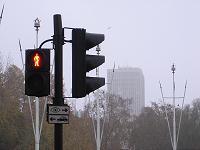In the Archive
 Veronika Schubert spends three months in Manchester, where she collects stories about language, people and everyday life to be told in backview. Two days a week, she volunteers at the International Anthony Burgess* Foundation, finding out about what it means to be an archivist.
Veronika Schubert spends three months in Manchester, where she collects stories about language, people and everyday life to be told in backview. Two days a week, she volunteers at the International Anthony Burgess* Foundation, finding out about what it means to be an archivist.
Two months ago, seated in the coach to Manchester, I wondered what my work placement at the IABF would be like and which would be my tasks, and I was hoping to learn as much as possible about the work of an archivist. Now, two months later, I have things to tell.
The Foundation
On Tuesdays and Wednesdays, I get on the bus, and off again at The B.B.C. (which has been moved by now but still lends its name to the bus station). In the Spar at the corner, I get myself some milk and breakfast biscuits and then find my way to 3 Cambridge Street. The building is impressive and pretty in a very Mancunian way: redbricks and a lot of glass – a modern interpretation of the city’s industrial past.
Although the IABF building is basically an archive for Anthony Burgess’s things and a location for cultural events, its most obvious part is the café, visible through the large glass front. When I arrive in the morning, usually one of the girls working there is getting ready for a day of preparing tea, sandwiches, and salads, and already chatting with the archive assistant or the secretary. Greeting them and exchanging how-do-you-dos on the way, I pass them by and make us some tea. Then I join their conversation, munching biscuits. And then it is time to go downstairs to the archive.
The Archive
The archive consists of several store rooms and a reading room. It contains several thousands of books formerly owned by Anthony Burgess, and many more of his belongings. There are manuscripts and photographs, video tapes and slides, correspondence and tarot cards. There are paintings, musical scores, and paper clippings. There are typewriters, many of them. There is furniture, musical instruments, toys, and Malayan art. There are so many things, it is hard to believe they belonged to one single person!
Some of these things are on regular display. When you come to the café to have a drink, you can buy a copy of one of Burgess’s books which once was lying around in his very own house. And when you go downstairs to the basement in order to use the bathroom, you will pass by harpsichords, bagpipes and a collection of fancy-coloured typewriters. If you like, you can even sit in the reading room among Burgess’s books and have a look at his own personally annotated copy of this one book you are writing your PhD thesis about.
However, many things still have to be catalogued, and this is where the work starts.
Archiving
From what I learned during the last two months, being an archivist means looking through things, establishing some kind of order to catalogue them, so they can easily be found again, maintaining and repairing them, and storing them away safely. In short: take a pile of stuff and turn it into a coherent collection accessible for the public.
The latest project in the IABF archive is the correspondence: several cardboard boxes brimming with random letters sent to Burgess over five decades. My task is to help the archive assistant go through all of them, free them from rusty staples and paper clips, read them, and gather them in folders according to what kind they are.
There are personal letters from family, friends and fellow authors, publisher’s correspondence, queries from translators and students, notes from secretaries and hotel receptionists, bills and contracts, Christmas cards, postcards and business cards, facsimiles and telegrams, and even empty envelopes.
Last but definitely not least, there is fan mail, which to me, is the most interesting part. Many fans simply ask for an autograph or a personally signed photo. Others express their genuine admiration for Burgess as an author. Some might comment on factual or spelling mistakes in his books, articles, interviews, and then there are those who criticise his allegedly blasphemous attitude towards Christianity. There are authors who send him their book asking for a favourable review. And every now and then, somebody writes to him, because they feel deeply understood in reading his books, and they will tell a little about themselves, often about the difficult situation they are in at the moment.
All those letters make me wonder, what would my own fan letter to my favourite author be like? How would I address them? Would I try to be witty and ironic, showing that I was above such a thing as openly admiring somebody, although, in fact, I was doing just that? Would I trust them enough to tell them about personal things? And would I mind if my letter was kept in an archive and read by archivists?
Back in the Present
And then, after a day spent with old letters, I leave the archive. It is late afternoon, it is dark and cold outside, and often windy. Sometimes I take the bus from The B.B.C. to take me back to Whalley Range. Sometimes I walk home and let the wild weather sweep all the ancient archive dust out of my brain. Welcome back in the present!
* Anthony Burgess (1917-1993) was, among other things, an English author, best known for his dystopian novel A Clockwork Orange. Wikipedia tells you in great detail that he was a lot more than that.
(Text and pictures: Veronika Schubert)